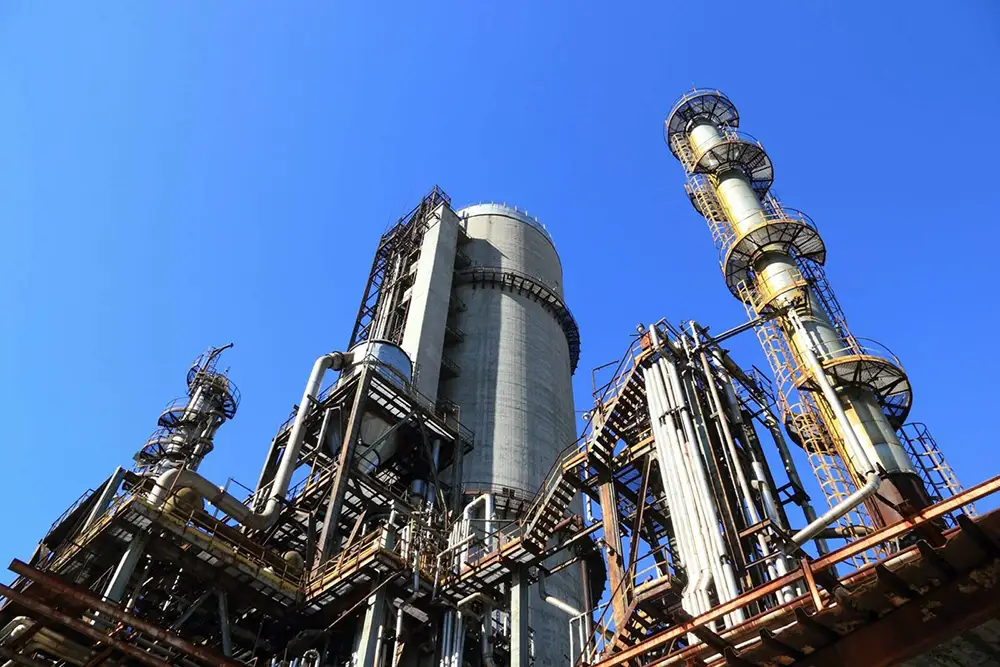O setor industrial global é um dos maiores emissores individuais de gases com efeito de estufa (GHG) do mundo, responsável por dois terços do total de emissões GHG do mundo. Mas é animador notar que os avanços recentes na tecnologia de fabricação e o comprometimento crescente com processos mais sustentáveis e ecoeficientes ajudaram a indústria a reduzir as emissões de Escopo 1, 2 e 3 em geral — e também começaram a abordar as emissões de Escopo 4.
O que são emissões de Escopo 1, 2, 3 e 4?

- Escopo 1: abrange emissões diretas de GHG de fontes de propriedade e controladas pela empresa. Atividades comuns incluem combustão de combustível; processamento físico ou químico; transporte de materiais, produtos, resíduos e funcionários; e emissões fugitivas.
- Escopo 2: abrange emissões indiretas de GHG causadas pela geração de eletricidade comprada usada para atividades do Escopo 1.
- Escopo 3: abrange emissões indiretas de GHG causadas por atividades upstream ou downstream na cadeia de valor mais ampla de uma empresa, como extração de matérias-primas (upstream) ou descarte de resíduos (downstream). As emissões de Escopo 1 e 2 de uma empresa são o Escopo 3 de outra empresa.
- Escopo 4: abrange emissões evitadas devido ao uso do produto de uma empresa. Diferentemente dos Escopos 1-3, quanto maior a pontuação de uma empresa nas emissões do Escopo 4, melhor. O Escopo 4 foi introduzido para fornecer um cálculo mais holístico do impacto climático positivo de um produto. Ele é relativamente novo e não é oficialmente reconhecido pelo Protocolo GHG.
Indústria 4.0: ajudando a indústria global a reduzir sua pegada de carbono
Os avanços na tecnologia, incluindo o avanço de ferramentas digitais e analíticas, resultaram em processos de fabricação mais ecoeficientes e emissões reduzidas.
A indústria de manufatura também está aproveitando as tecnologias da Indústria 4.0, como a Internet das Coisas (IoT), aprendizado de máquina, inteligência artificial (IA) e automação para rastrear, monitorar e melhorar o uso de recursos para uma pegada de carbono mais leve.
Vários estudos de caso apresentados pelo Fórum Econômico Mundial ilustrar isso.
A fábrica inteligente da Ericsson em Lewisville, Texas, nos EUA, mostra como os fabricantes estão integrando soluções de energia verde e dados para 'reduzir, reutilizar, reciclar', reduzindo simultaneamente as emissões de Escopo 1 e 2 e melhorando a produtividade.
Painéis solares no local e tanques de resfriamento de água da chuva reduzem a necessidade de eletricidade comprada (Escopo 2), enquanto uma rede de sensores 4G/5G monitora e analisa o consumo de energia, ligando ou desligando automaticamente o equipamento conforme necessário (Escopo 1).
Com métricas relacionadas à sustentabilidade sendo cada vez mais examinadas por investidores, partes interessadas e consumidores, os fabricantes também têm prestado mais atenção às emissões de Escopo 3 de seus parceiros, fornecedores e distribuidores.
Para lidar com isso, a Western Digital em Prachinburi, Tailândia, combinou sensores conectados à IoT e tecnologia de aprendizado de máquina para rastrear dados de logística em tempo real e desenvolver um otimizador de remessa e logística. Eles efetivamente eliminaram remessas desnecessárias, melhoraram a eficiência das rotas e reduziram as emissões de Escopo 3 relacionadas ao transporte.
A natureza multifacetada da sustentabilidade na indústria
Embora o rastreamento de emissões em toda a cadeia de valor de ponta a ponta seja altamente complexo, com vários níveis de matérias-primas e subcomponentes a serem considerados e emissões de Escopo 4 ainda mais além do controle e acesso dos fabricantes, abordar as emissões de Escopo 3 continua sendo uma das maneiras mais críticas de reduzir a pegada de carbono da indústria global.
Isto é especialmente importante porque as emissões da cadeia de fornecimento de produção são mais de 11 vezes mais do que as emissões operacionais.
Consequentemente, a chave para uma redução mais bem-sucedida das emissões de Escopo 1, 2 e 3 – e para abordar as emissões de Escopo 4 – é o compartilhamento de dados e a transparência.
É necessária uma colaboração global para compartilhar informações relacionadas às emissões para que os fabricantes possam medir e monitorar melhor sua pegada de carbono em toda a cadeia – e identificar as maneiras mais impactantes de reduzi-la.
Saiba mais sobre o trabalho que temos feito para ajudar os fabricantes globais a se transformarem e alcançarem melhores resultados para todos aqui.



